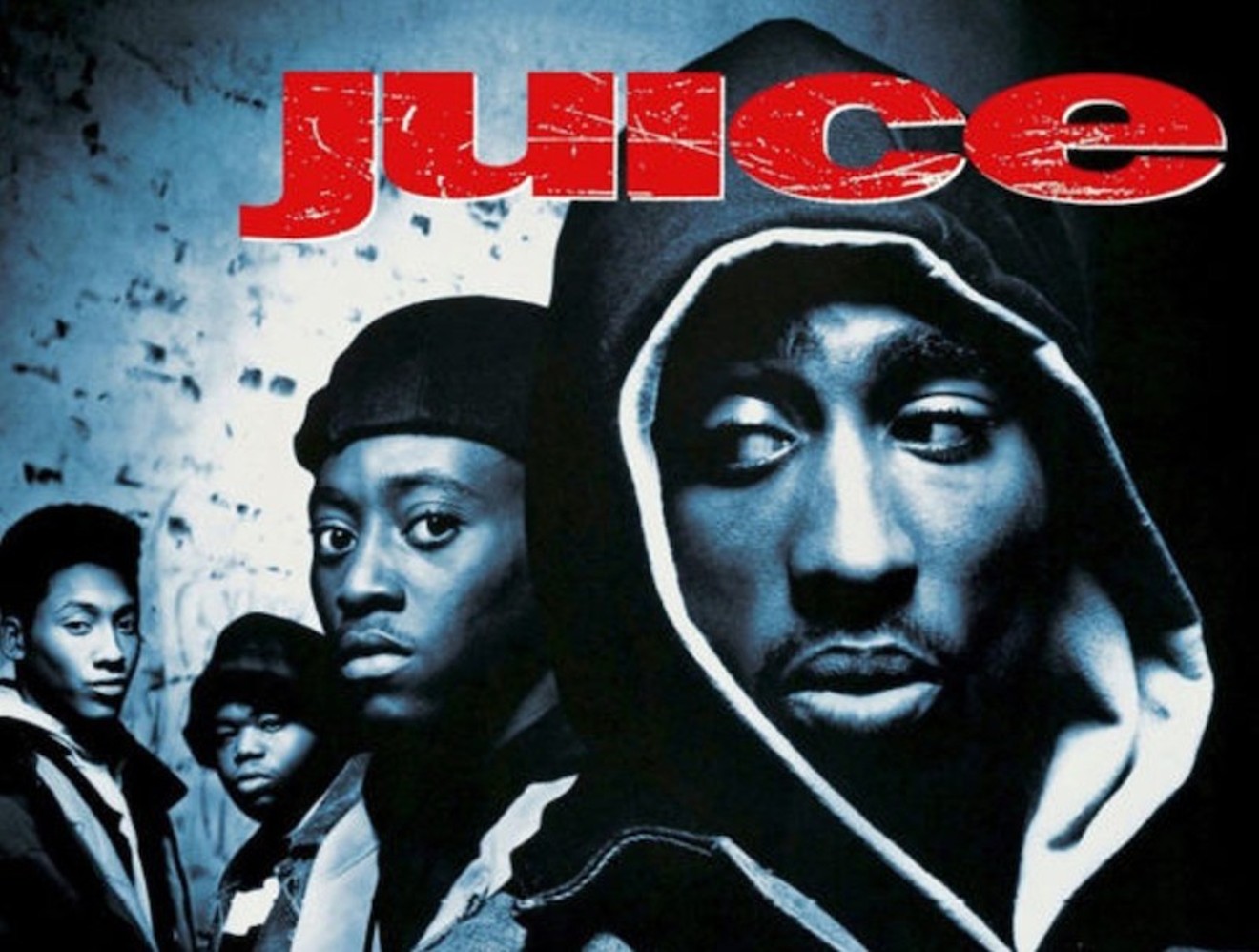The ending of Juice is among the worst in cinematic history.
In case you need a refresher for a 25-year-old film, let’s backtrack. Bishop (Tupac) has a newfound thrill for taking matters in his own hands after getting teased over his father’s homosexuality post-prison and bullied by neighborhood hood Radames. His friends, Q, Raheem and Steel, are his only form of protection. The foursome happen to catch a neighborhood acquaintance involved in a robbery where he eventually dies. It inspires Bishop to take matters into his own hands; eventually he convinces Raheem and Steel to take part in a robbery. Again, all this seems plausible for a guy with legit psychological issues, right? Right.
Now, the film gradually accelerates to prove one thing: The constantly tormented Bishop is now consumed by his own power. The moment he gets a gun in his hands, it’s liberation to him, for all the wrong reasons. When it’s all said and done, he has shot and killed three people, wounded a fourth, and finds himself in the precarious position of no longer having control of his life. Now, freeze-frame.
Bishop, who at this point is a maniac, is hanging from the ledge of an apartment building. His entire hubris of wanting to die evaporates when he faces the very real possibility that it will occur. Q, the person holding onto him and trying to pull him up, can’t, in a callback to an earlier point in the film when they were getting chased by the cops. Bishop dies a tragic villain. Now, after all of this, Q begins to walk away but not before somebody says, with as much tone-deafness as a political speech to the Boy Scouts of America, “You got the Juice now.”
The movie ends soon after that.
Now, for a solid decade I had owned up and said to myself, “Hey, Juice ended about right. Bishop went crazy and got undone by his own thoughts and actions. The guy told Q that because now Q had the rep of being a big man on the streets whether he wanted to be or not.” Not until college did I realize my mistake: That man congratulated Q for accidentally dropping his friend from an apartment building.
In what time or space is that even logically cool or sound? He didn’t give Q space or anything to grieve or figure out what he’d done. In fact, he doesn’t even ask him if he’s okay considering that Q and Bishop (a) wrestled over a gun on top of a rooftop and (b) wrestled over said gun in a crowded elevator. Nope, he ignores all common sense to drop what amounts to a cheesy one-liner suited for a Western. What help does it do if you’ve got more than 20 witnesses to what pretty much is an accident and the only decent thing you can tell someone is, “Hey, you kinda murdered your homeboy but you’re the man on these streets now.” It’s like the Mean Joe Greene Coca-Cola commercial of murders.
Had they gone with the original ending, of Bishop choosing to fall to his death to evade the cops? Oh, it would have made that last sentence uttered in the film even more ridiculous. In fact, the ending of Juice is up there with the entire tone of “Regulate” by Warren G and Nate Dogg in regard to ridiculous things you remember and will forever associate with the term “great.” Mind you, “Regulate” was the first Def Jam single by Warren G, the label’s first ever West Coast signee and cousin to Dr. Dre, of all things. “Regulate,” sampling Michael McDonald’s “I Keep Running” to perfection, manages to weave a story in which Warren immediately gets robbed after checking out a dice game on 21 and Lewis and Nate has to go save the day. Know what’s the problem in “Regulate?” Warren G takes full credit for the regulating.Warren G, if you recall, didn't participate in any regulating.
tweet this
Warren G, if you recall, didn't participate in any regulating. The only regulating Warren G did that night? Making sure to transfer his rings and Rolex to the dudes who were robbing him as fast as possible. What was next, Warren? Probably your wallet. Matter of fact, definitely your wallet. Also, if you left those women on the curb, chances are they saw the robbery. Why would they want to be near a dude who gets robbed the moment he gets out of the car? Exactly.
Is Juice a terrible movie? Not at all. It properly ranks as the finest film moment of Tupac Shakur’s brief life. It includes several actors who have gone on to greater things down the road, such as Omar Epps, Queen Latifah and Samuel Jackson. Does it own the title for the worst ending, period, in all of cinema? No, there was Sucker Punch and X-Men Origins: Wolverine and the last Fantastic Four movie, so it escapes that terrible distinction. But the only lesson to be learned from Juice? Don't ever tell somebody something fake-deep right after they've killed someone.







